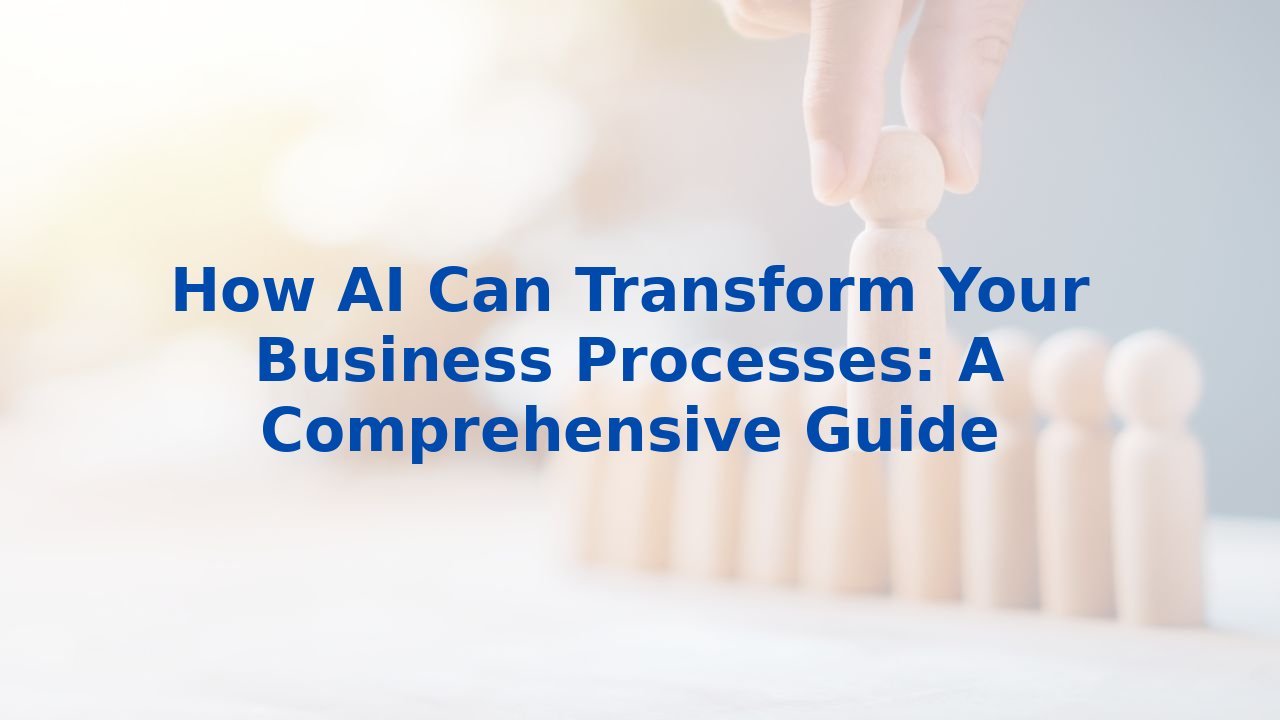How AI Can Transform Your Business Processes: A Comprehensive Guide
How AI Can Transform Your Business Processes: A Comprehensive Guide
Introduction
In an era where speed and efficiency dictate the pulse of business success, artificial intelligence (AI) stands out as a transformative force. From automating everyday tasks to enhancing insightful decision-making capabilities, AI is redefining the way organizations operate. This article explores how leveraging AI in business processes can lead to unparalleled efficiency and productivity gains, ultimately propelling your organization into a new frontier of operational excellence.
Understanding AI Process Optimization
At its core, AI process optimization is about harnessing the power of machine learning and AI technologies to refine business practices. By analyzing vast amounts of data and automating repetitive tasks, businesses can reduce errors and enhance decision-making. The overarching aim is to streamline workflows, minimize manual input, and most importantly, elevate operational efficiency.
Key Benefits of AI in Business Process Management
Integrating AI into your business processes offers numerous compelling advantages:
1. Automating Routine Tasks
AI excels at digesting high-volume, repetitive tasks such as data entry, document processing, and form filling. By automating these activities, organizations can not only minimize human error but also liberate employees to engage in more strategic and high-value initiatives.
2. Improving Decision Making
AI's capability to analyze patterns and provide predictive recommendations empowers business analysts to conduct simulations without real-world implications. This helps stakeholders gauge different strategies—be it in pricing, resource allocation, or customer acquisition—with heightened confidence.
3. Enhancing Operational Efficiency
By rapidly organizing and analyzing vast datasets, AI provides insights that can significantly hasten decision-making processes. This ability enables organizations to reveal trending insights, predict eventualities, and deep dive into the root causes of inefficiencies.
4. Streamlining Processes
AI technologies can create and scrutinize operational processes more efficiently than traditional methods could ever achieve. By developing comprehensive process maps and automating manual steps, AI aids in continuous monitoring and timely alerts of potential disruptions.
5. Enhancing Customer Experience
In the quest for superior customer satisfaction, AI plays a vital role—whether it's through intelligent chatbots managing basic inquiries or analyzing feedback for improvement. These applications help deliver a more personalized and efficient customer experience, enhancing brand loyalty and retention.
Real-World Applications of AI in Business Processes
The transformative impact of AI is visible across various sectors:
1. Supply Chain Management
AI-driven models analyze purchasing data in real-time, empowering retailers to detect anomalies and respond agilely to market changes. This foresight can drastically reduce stock-outs and mitigate the dangers of overstocking.
2. Sales and Marketing
Utilizing AI in customer relationship management (CRM) can unveil insights about customer behavior, guiding businesses towards more targeted campaigns that focus on high-revenue individuals, thereby streamlining marketing outreach.
3. HR and Recruitment
AI revolutionizes human resources by consolidating extensive data for better salary negotiations, refining candidate selection processes, and automating time-consuming administrative tasks. These innovations aid in fostering a more engaged workforce.
4. Risk Prediction and Compliance
Through the analysis of logs and events, AI can unearth deviations within established processes, exposing potential risks before they elevate into larger problems. This kind of proactive intervention ensures regulatory compliance and minimizes operational fallout.
The Role of Employee Training in AI Implementation
Investing in AI technology is only one half of the equation; the other half lies in empowering your workforce through specialized training. Here’s how employee education can enhance the effectiveness of AI:
1. Understanding AI Capabilities
Training employees on what AI can realistically achieve enables seamless technology integration, enhancing workflow and efficiency.
2. Data Analysis Skills
Arming employees with data analysis competencies allows them to interpret AI-generated insights, guiding intelligent decision-making in varying contexts.
3. Process Optimization Techniques
Training fosters a culture of identifying opportunities for AI application, maximizing its impact on organizational efficiency.
4. Continuous Learning
Encouraging a mindset of perpetual growth ensures that staff remain informed of the latest in AI advancements, keeping your company adaptable in a fast-evolving landscape.
Conclusion
AI is not merely a tool; it is a catalyst for change, driving businesses toward unparalleled efficiency and productivity. From automating mundane tasks to reshaping decision-making, the potential of AI is immense. However, the journey doesn’t end with implementation; it thrives on well-trained employees who can harness its capabilities to their fullest extent. By committing to AI integration and fostering an environment conducive to continuous learning, organizations can unlock a trajectory of sustained success in the modern marketplace. Ready to elevate your business processes? Discover more about Complete AI Training and how it can empower your workforce today.



